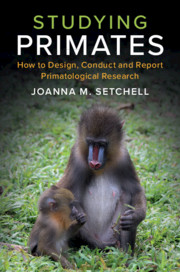Book contents
- Studying Primates
- Studying Primates
- Copyright page
- Dedication
- Contents
- Preface
- Acknowledgements
- 1 Asking Questions about Primates
- 2 Ethics in Primatology
- 3 Keeping Science Healthy: Research Integrity
- 4 Inclusive Science
- 5 Understanding Statistical Evidence
- 6 Communicating Ideas in Writing
- 7 Introduction to the Primates
- 8 Why Study Primates?
- 9 Identifying a Research Question
- 10 Finding Out What We Know
- 11 Reading Journal Articles
- 12 Formulating Hypotheses and Predictions and Designing a Study
- 13 Observing and Manipulating
- 14 Choosing Measures
- 15 Planning Data Analysis
- 16 Sampling and Statistical Power
- 17 Checking Feasibility and Finalising Your Plans
- 18 Writing a Research Proposal
- 19 Collecting Data
- 20 Conducting Fieldwork
- 21 Analysing and Interpreting Data
- 22 Writing a Scientific Report
- 23 Submitting to a Peer-Reviewed Journal
- 24 Presenting Your Work at a Conference
- 25 Conclusions
- Index
- References
18 - Writing a Research Proposal
Published online by Cambridge University Press: 19 September 2019
- Studying Primates
- Studying Primates
- Copyright page
- Dedication
- Contents
- Preface
- Acknowledgements
- 1 Asking Questions about Primates
- 2 Ethics in Primatology
- 3 Keeping Science Healthy: Research Integrity
- 4 Inclusive Science
- 5 Understanding Statistical Evidence
- 6 Communicating Ideas in Writing
- 7 Introduction to the Primates
- 8 Why Study Primates?
- 9 Identifying a Research Question
- 10 Finding Out What We Know
- 11 Reading Journal Articles
- 12 Formulating Hypotheses and Predictions and Designing a Study
- 13 Observing and Manipulating
- 14 Choosing Measures
- 15 Planning Data Analysis
- 16 Sampling and Statistical Power
- 17 Checking Feasibility and Finalising Your Plans
- 18 Writing a Research Proposal
- 19 Collecting Data
- 20 Conducting Fieldwork
- 21 Analysing and Interpreting Data
- 22 Writing a Scientific Report
- 23 Submitting to a Peer-Reviewed Journal
- 24 Presenting Your Work at a Conference
- 25 Conclusions
- Index
- References
Summary
Once you have a research question, hypotheses and predictions, study design, detailed methods and data analysis plan, you have all you need to write a research proposal. Writing a proposal clarifies your thoughts and ensures that they are feasible. You can share a proposal with other people to get feedback on your plans and use it to underpin funding applications. Whatever you propose to study, you are likely to need funding for equipment, supplies, transport, and other expenses. You may also need to cover tuition fees and living expenses. When you apply for funding you enter a competition. Most applications are unsuccessful. Some of the factors affecting success are out of your hands, such as the success rate, and luck. Some, however, are not, and excellent proposals share characteristics. In this chapter, I explain how you can improve your chances of obtaining funding by applying to appropriate organisations, tailoring your proposal carefully, following guidelines, and seeking feedback while preparing your application. I provide general points on writing and details of each section of a proposal. Finally, I address how to deal with the outcome of the funding decision. I focus on relatively small grants appropriate for PhD students and post-doctoral scholars. Much of the advice also applies to PhD project proposals.
- Type
- Chapter
- Information
- Studying PrimatesHow to Design, Conduct and Report Primatological Research, pp. 223 - 240Publisher: Cambridge University PressPrint publication year: 2019
References
Further Reading
18.9 Further Reading
Also look out for blogs and websites with advice on writing funding applications.



